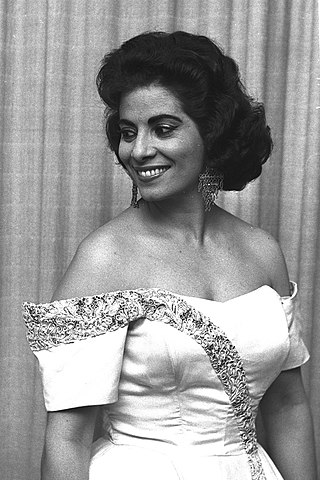
Ofra Haza was an Israeli singer, songwriter and actress, commonly known in the Western world as "the Madonna of the East", or "the Israeli Madonna". Her voice has been described as a "tender" mezzo-soprano. In 2023, Rolling Stone ranked Haza at number 186 on its list of the 200 Greatest Singers of All Time.

Yemen, a country on the Arabian Peninsula, holds a prominent position in the realm of music, garnering recognition for its distinctive musical traditions. Revered as a cultural capital within the Arab world, Yemen has contributed significantly to the musical landscape of the region.
The music of Israel is a combination of Jewish and non-Jewish music traditions that have come together over the course of a century to create a distinctive musical culture. For almost 150 years, musicians have sought original stylistic elements that would define the emerging national spirit. In addition to creating an Israeli style and sound, Israel's musicians have made significant contributions to classical, jazz, pop rock and other international music genres. Since the 1970s, there has been a flowering of musical diversity, with Israeli rock, folk and jazz musicians creating and performing extensively, both locally and abroad. Many of the world's top classical musicians are Israelis or Israeli expatriates. The works of Israeli classical composers have been performed by leading orchestras worldwide.

Israeli hip hop refers to hip hop and rap music in Israel. Israeli hip hop artists have mainly emerged from the populations of Mizrahi Jews, Ethiopian Jews, and Israeli-Arabs, though there have also been numerous artists from Israeli Ashkenazi Jews especially Hasidim. Israeli hip hop artists enjoy wide popularity in Israel and have succeeded in appealing to international markets particularly the United States.

Shoshana Damari was a Yemeni-Israeli singer known as the "Queen of Hebrew Music."

Mizrahi music refers to a music genre in Israel that combines elements from Europe, the Middle East and North Africa; and is mostly performed by Israelis of Mizrahi Jewish descent. It is usually sung in Modern Hebrew, or literary Hebrew.
Arabic hip-hop is a segment of hip hop music performed in the Arabic-speaking world. Due to variety of dialects and local genres which exist in the localities, Arabic hip-hop music may appear very diverse depending on the country of the song. Like most artists of the genre, the hip-hop artists from the Arabic-speaking world are highly influenced by American hip-hop.

DAM is a Palestinian hip-hop group founded in 1999 by brothers Tamer and Suhell Nafar and their friend Mahmoud Jreri from the mixed city of Lod. In 2015 female singer Maysa Daw joined the group. The group's songs are themed on protest, inequality, Israeli–Palestinian conflict, and self-criticism of Arab-Israeli society, including the violence and drug dealing within Israel's mixed cities. DAM is the best-known and most famous Palestinian hip hop group; it is also often called the "quintessential Palestinian resistance band".

Shaday is an album by Israeli singer Ofra Haza, released in 1988. Shaday, recorded in both Tel Aviv and England, became Haza's international breakthrough album and includes the Hebrew-English language remix singles "Im Nin'alu" and "Galbi," as well as "Shaday" and "Da'Ale Da'Ale," also released as remix singles.

Yemenite Songs is a 1984 album by Ofra Haza, in which the Israeli pop star returned to her roots interpreting traditional Yemeni Jewish songs with lyrics coming from the poetry of 16th century Rabbi Shalom Shabazi. The album was recorded with both traditional and modern musical instruments; wooden and metal percussion, Yemenite tin and tambala, strings, brass and woodwind as well as drum machines and synthesizers. The songs are sung in Hebrew with a Yemenite accent and in Arabic.

At Montreux Jazz Festival is a 1998 album by Israeli singer Ofra Haza. The recording which captures Haza and a five-piece band live at the Montreux Jazz Festival in July 1990 comprises material from her international studio albums Shaday, Yemenite Songs and Desert Wind, including hit singles like "Im Nin' Alu", "Galbi", "Shaday", "Ya Ba Ye", as well as Yemeni Jewish traditionals and the a cappella performance of "Love Song" with lyrics from The Song of Songs.

"Galbi" is an Arabic musical poem by Yemenite Aharon Amram that was sung by Israeli Yemenite singer Ofra Haza and others. The 1988 remix of the song, taken from the album Shaday, was issued as the follow-up to Haza's worldwide chart hit "Im Nin'Alu ".

Haim Moshe, born 20 September 1955 is an Israeli singer whose musical style has crossed over from Yemenite and Mediterranean "ethnic" music to include mainstream Israeli and western pop elements. He has helped Mizrahi music achieve wide popularity both in Israel and in Arab countries.
Yemeni hip hop is a Yemeni music style and cultural movement related to rap and hip hop culture. It has influences from American hip hop and also from traditional music from the region. It is usually considered to have emerged from mid-2000s and reached its consolidation by 2009 when the first public concert was held in the French Cultural Institute. Although it has a variety of themes, there was an intense production of political songs by the Yemeni Revolution.

Balqees Ahmed Fathi, widely known by the mononym Balqees (بلقيس), is a Yemeni-Emirati singer and actress. She came from an artistic family as her father Ahmed Fathi was a well-known Yemeni musician and her mother is also a Yemeni with an Emirati citizenship.
Yemenite Jewish poetry, often referred to as "paraliturgical poetry" because of its religious nature, has been an integral part of Yemenite Jewish culture since time immemorial. The Jews of Yemen have preserved a well-defined singing arrangement which not only includes the very poetic creation itself, but also involves a vocal and dance performance, accompanied in certain villages outside Sana'a by drumming on an empty tin-can (tanakeh) or a copper tray. The Jews of Yemen, maintaining strict adherence to Talmudic and Maimonidean halakha, observed the gezeirah which prohibited playing musical instruments, and "instead of developing the playing of musical instruments, they perfected singing and rhythm." This arrangement was integrated into the walks of life familiar to the Jews of Yemen. The texts used in the arrangement were put down in writing and later included in separate song collections (dīwāns). The social strictures and norms in Yemenite Jewish culture provide for separate settings for men and for women, where the sexes are never mixed. Men’s song usually expressed the national aspirations of the Jewish people, and it was far removed from the singing associated with the Muslim environment, whereas folk songs of Jewish women were sung by rote memory and expressed the happiness and sorrows inherent in their daily life and was, as a rule, closer to that of Muslim women.
Shlomit Levi is an Israeli singer. She is a member of the folk metal group Orphaned Land, performing on their albums Mabool (2004), The Never Ending Way of ORWarriOR (2010) and Unsung Prophets & Dead Messiahs (2018). She currently performs with American guitarist Bruce Burger as the world music duo Shlomit & RebbeSoul.
Shlomit & RebbeSoul is an Israeli-American world music duo, consisting of Yemeni-Israeli singer Shlomit Levi and American musician RebbeSoul. Formed in 2011, they released their debut album, The Seal of Solomon, in 2015.
Aharon Amram is an Israeli singer, composer, poet and researcher of Yemenite Jewish origin.

Bracha Zefira was a pioneering Israeli folk singer, songwriter, musicologist, and actress of Yemenite Jewish origin. She is credited with bringing Yemenite and other Middle Eastern Jewish music into the mix of ethnic music in Palestine to create a new "Israeli style", and opening the way for other Yemenite singers to succeed on the Israeli music scene. Her repertoire, which she estimated at more than 400 songs, included Yemenite, Bukharan, Persian, Ladino, and North African Jewish folk songs, and Arabic and Bedouin folk songs and melodies.













